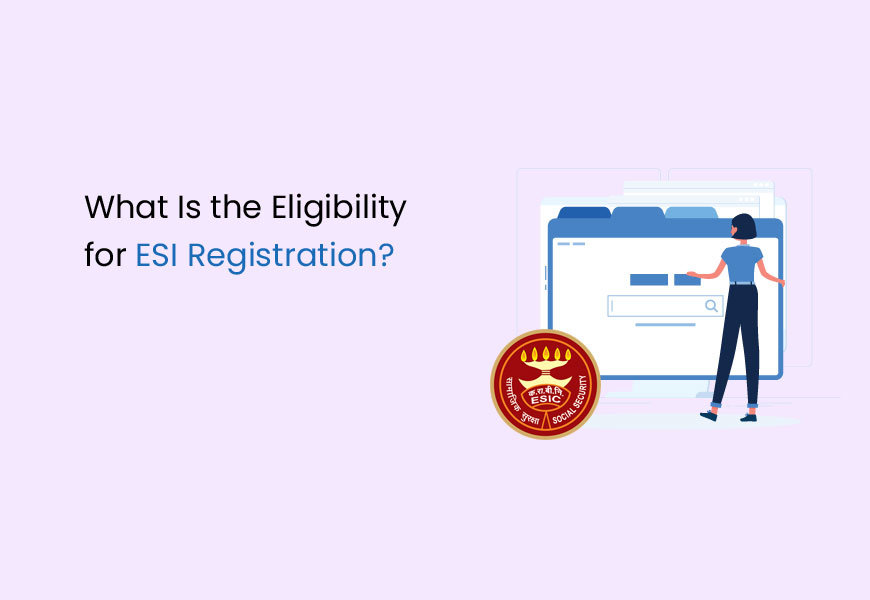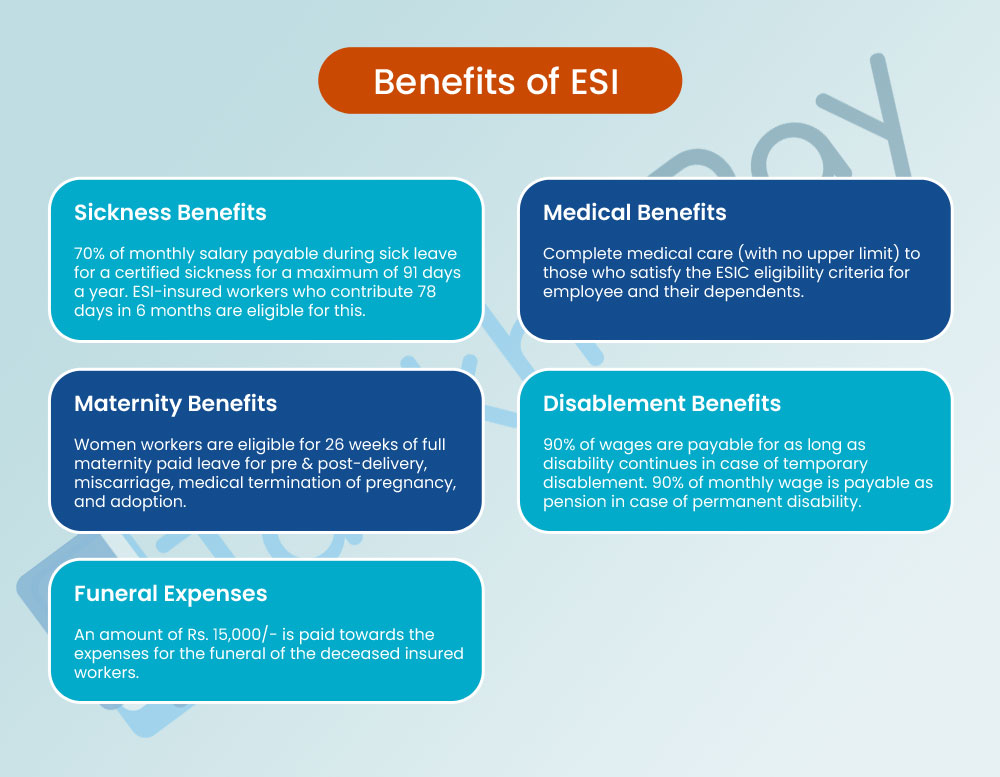

ESI (Employee State Insurance) is a government scheme, as per the ESI Act, 1948. It provides social security benefits to workers and is managed by the Employee State Insurance Corporation (ESIC). Employers should register their establishment with ESIC and provide the details of their workers to include them in the scheme.
The government has set up specific rules and regulations for the same. However, employers find it overwhelming to follow the complex rules. It can be hard to understand ESI eligibility for employers and provide the necessary documents without expert help.
A person employed in an establishment/ factory/ shop with over 10 employees is eligible for ESI benefits under Section 2(12) of the ESI Act, 1948. All workers in various industries and sectors and their dependents are eligible to receive ESI medical benefits from ESIC-run hospitals and dispensaries.
Women employees with less than Rs. 21,000/- and Rs. 25,000/- (people with disabilities) monthly salary have the eligibility for maternity benefits under ESI Act. They can claim medical and cash benefits and paid leave for pregnancy (pre & post-delivery), medical termination, miscarriage, and adoption.
The employer has to provide a copy of the following documents to register for ESI. Since the registration process is performed online, a soft copy (digital/ electronic) of the documents should be uploaded to the ESIC website.
Additional documents may also be required in certain cases. Those are as follows:
The ESIC (Employees’ State Insurance Corporation) has transitioned from manual to entirely online registration. This streamlined approach ensures efficiency and accessibility for employers. Below, we present a step-by-step guide to the ESIC online registration process:
Step 1: Logging into the ESIC Portal
Step 2: Confirmation Mail
Step 3: Employer Registration Form-1
Step 4: Payment for Registration
Step 5: Receipt of Registration Letter
ESIC (Employee’s State Insurance Corporation) registration offers many advantages for both employers and employees, fostering a comprehensive and humane approach to employee well-being. The multifaceted benefits encompass:

1. Sickness Benefits
70% of monthly salary payable during sick leave for a certified sickness for a maximum of 91 days a year. ESI-insured workers who contribute 78 days in 6 months are eligible for this. For employees suffering from long-term diseases, the Extended Sickness Benefit is eligible for up to 2 years in an ESB period of 3 years.
2. Extended Sickness Benefits
In cases of severe and prolonged illnesses such as 34 malignant diseases, employees can receive extended sickness benefits for up to two years, at a rate of 80% of their wages.
3. Enhanced Benefits for Family Planning
Employees undergoing sterilisation for family planning receive enhanced sickness benefits equivalent to their full wages. This extends to 7 days for Vasectomy and 14 days for Tubectomy.
4. Medical Benefits
Complete medical care (with no upper limit) to those who satisfy the ESIC eligibility criteria for employee and their dependents. Permanently disabled and retired workers can avail of ESI medical benefits by paying Rs. 120/- as a premium per year.
5. Retirement Benefits
Retired employees and their spouses can continue to enjoy medical benefits by paying a nominal annual premium of Rs.120.
6. Maternity Benefits
Women workers are eligible for 26 weeks of full maternity paid leave for pre & post-delivery, miscarriage, medical termination of pregnancy, and adoption.
7. Death Benefits
In the unfortunate event of an employee’s demise due to employment-related injury or occupational hazards, dependents receive 90% of the deceased employee’s wages as a monthly payment.
8. Temporary Disablement Benefits
Employees facing temporary disablement due to employment injury receive 90% of their wages until the disability persists.
9. Permanent Disablement Benefits
Those experiencing permanent disablement receive 90% of their wages monthly, determined by the extent of loss of earning capacity, as certified by a Medical Board.
10. Funeral Expenses
An amount of Rs. 15,000/- is paid towards the expenses for the funeral of the deceased insured workers. The dependent or the eldest surviving family member (the person who incurs the funeral expenditure) can apply for the amount through the ESIC website.
ESIC registration, thus, emerges not only as a statutory obligation but also as a humane commitment to the holistic well-being of the workforce, ensuring financial security and healthcare support across various life stages.
Post ESIC (Employee’s State Insurance Corporation) registration, an establishment is obligated to adhere to specific compliances and file requisite returns. These obligations are crucial for ensuring seamless operation and adherence to regulatory standards. The mandatory compliances include:
After ESIC registration, employers are mandated to file ESI returns on a half-yearly basis. The necessary documents for filing these returns include:
According to the ESI Act, an establishment is defined as an organized group of men or women or an institution, irrespective of the location. Any establishment (including stores and shops) has to register for ESI if it employs 10 or more workers (20 workers in some states) with a maximum monthly salary of Rs. 21,000/- (and Rs. 25,000/- for people with disabilities).
The Supreme Court said that ESI Act is beneficial to workers and that the term ‘shop’ should be interpreted broadly to cover as many establishments as possible. Hence, a location where a commercial transaction (sale/ purchase) takes place can be classified as a shop. If such a shop has 10 or more workers, it has to be registered with ESIC.
While all consultancy companies, estate service providers, advertising and liaison agencies, movie theatres, educational institutions, etc., are eligible for ESI registration, a private commercial hospital, and a Chartered Accountant’s office are not covered under the term.
In the ESI scheme, workers and employers contribute a fixed portion of the workers’ salary towards medical and monetary benefits for the worker. ESI applies to male and female workers in different sectors. The employer contributes 3.25% of the total monthly salary payable to the worker, and the worker contributes 0.75% of their monthly salary. This amount will be collected and paid to ESIC as a premium for the social security benefits offered under the scheme.
Why Use TankhaPay App to Provide ESI Benefits to Informal Workers
Registering for PF and ESI can be complicated, even when the process is done online. However, employers cannot avoid ESI registrations and risk legal action. The best choice is to use the TankhaPay app to become ESI and EPF-compliant without wasting time and resources on registrations and verifications.
TankhaPay streamlines the process to eliminate paperwork and legal risks. An employer using the TankhaPay app to pay social security benefits to workers will automatically be compliant and avoid penalties.
Furthermore, the TankhaPay app helps you track employee attendance, structure salary, and automate salary payments. The TankhaPay team will also assist workers to access their PF and ESI benefits directly through the app. No more worrying about compliance, records, and ESI returns. Everything is seamlessly managed by the TankhaPay app.
You can pay PF and ESI social security benefits to informal workers, temporary staff, part-time employees, etc., even if you have less than 10 workers. All kinds of employers, including (but not limited to) households, can provide social security benefits to their workers through TankhaPay.
To register for ESIC, follow these steps:
To obtain an ESI card online, follow these steps:
The ESI amount is automatically calculated based on the employee's salary, and there is generally no separate application process for it. Employers contribute a percentage of the employee's salary to the ESIC fund, and employees also contribute a smaller percentage. These contributions collectively form the ESI amount, which is utilised to provide health and medical benefits to covered employees.
Employees earning less than a specified wage limit (as defined by ESIC) and working in a covered establishment are eligible for ESI benefits. The eligibility criteria may vary, and it's essential to check the latest guidelines issued by ESIC.
There is no specific registration fee for ESIC. However, employers and employees contribute a percentage of the employee's salary to the ESIC fund. The contribution rates are set by the ESIC and are subject to periodic revisions. It's advisable to check the latest rates and guidelines on the official ESIC website or contact the ESIC office for the most up-to-date information.
The eligibility age limit for family members applies only to unmarried daughters and sons (up to 25 years of age) and minor brothers/ sisters. Other dependents like spouses, infirm sons/daughters, and parents are eligible to be dependents irrespective of age.
The wage limit coverage for ESI per employee is Rs. 21,000/- per month and Rs. 25,000/- per month for people with disabilities. Employees earning more than this amount as a monthly salary are not eligible for ESI coverage.
ESIC benefits can be claimed in two ways:
The list includes 34 diseases classified into 11 categories.
How useful was this post?
Click on a star to rate it!
Average rating 0 / 5. Vote count: 0
No votes so far! Be the first to rate this post.